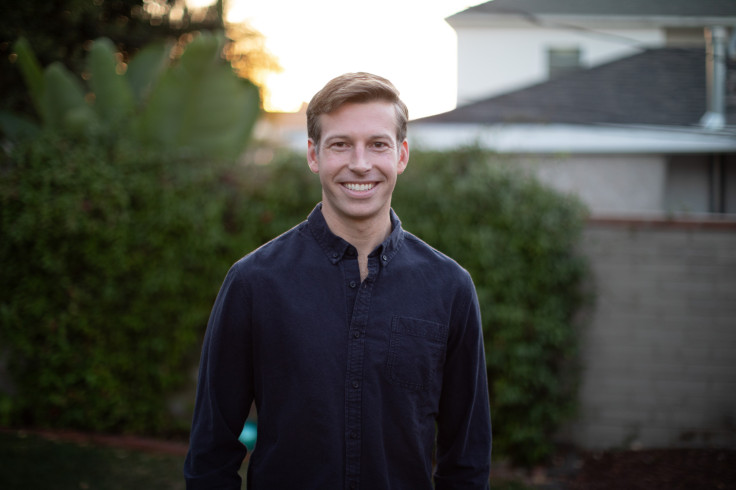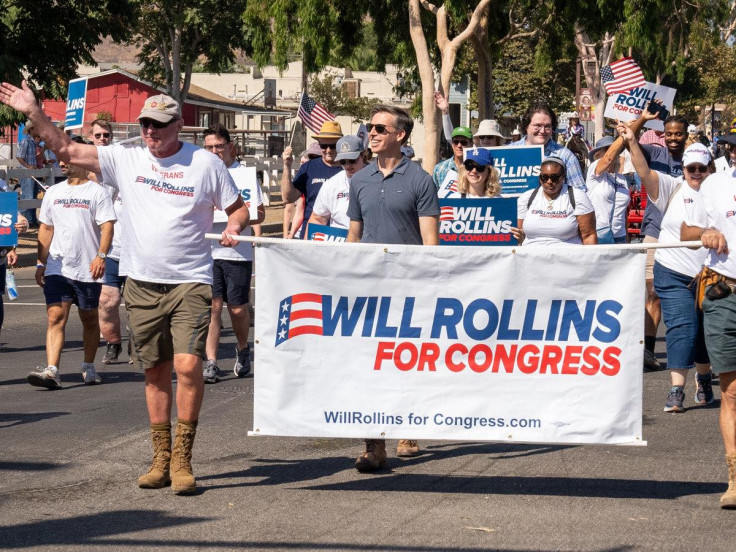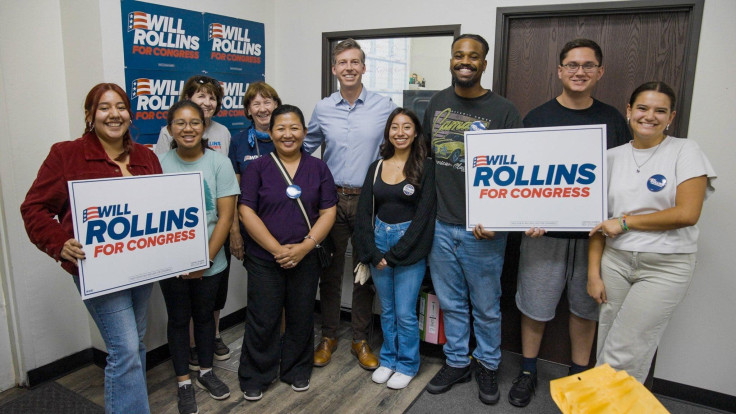
A Congressional race in California's Inland Empire could determine which party will control the Lower House this fall. As November quickly approaches, eyes around the country are turning to the state's 41st district to see if a former federal prosecutor and assistant U.S. Attorney can unseat a Representative who's held his seat for over three decades.
That is the mission of Will Rollins, a Democratic California attorney who is running on his experience as a terrorism prosecutor.
Come November, Rollins will face off incumbent Republican Rep. Ken Calvert, who has held onto his seat in the U.S. House since 1992. Due to redistricting, Calvert has represented different territories in the state. He used to be a small business owner, and is running on his political experience, highlighting his membership on the House Committee on Appropriations and his role as chair of the Appropriations Subcommittee on Defense.
This isn't the first time the duo go neck-in-neck for this seat. In 2022, Calvert won the race by 11,100 votes, according to Ballotpedia. But despite the loss, Rollins' performance turned into the closest a Democratic candidate has come to beating Calvert since he was first elected.
The highly-anticipated race is expected to be close due to a 2021 redistricting that changed the landscape of voters in the Inland Empire. The 41st District now stretches from Corona down to Lake Elsinore, and all the way to include Palm Springs and La Quinta.
The race is considered a toss-up by the Cook Political Report, but Rollins is confident that the fact he is running in a presidential election year will increase voter turnout in his favor.
Rollins recently sat down with the Latin Times to discuss the upcoming contest and his stances on issues that are important to Latinos, who make up the second largest demographic in his district.
This interview has been edited for length and clarity.
Latin Times: in November, you will face off Ken Calvert once again for the seat in District 41. Back in 2022, Calvert won by a small but decisive margin. How are you and your campaign approaching this matchup differently?
Will Rollins: I think the biggest difference is that people are having a chance to get to know me. I only had six months after my primary the first time that I ran, and I came from a career that was in law enforcement and national security, and so I'd never held any political office before or been involved in campaigns before. So it's a steep learning curve to go from counterterrorism to political candidate, and even in that very short period of time, we ended up having the closest midterm against Calvert that anyone has ever had in 30 years. And we also saw that candidates were getting crushed on our side of the aisle. We had a very close, close election, and also lost less than 1% off the democratic total in 2020 and I think that that, to me, was the biggest indicator that we can flip the seat in 2024 because in presidential years with higher turnout, the odds of success increased dramatically, and we had an eight point gap in turnout between Republicans and Democrats in the midterms and in 2024 we're working day and night to make sure that every Democrat votes in this election. And we know that there are 30,000 Democrats who have voted in one election since 2016 in our congressional district, but skipped 2022 and those low propensity Democrats are extremely caught up to vote for the top of the ticket, and they've also had a chance to get to know more about me, which is which has been really helpful.
LT: Hispanics are the second largest population in your district. How do you appeal to this group who may want a change from Calvert, a representative who's been in office since the 90s? Also, how do you appeal to Latinos and other groups who may be undecided about wanting a change?
WR: Yeah, I would say the number one thing that I try to do is listen and to educate myself about what the community needs. And we're really happy in this second campaign to have had the time and ability to create a Latino Advisory Board with community leaders from across Riverside County. I've had incredible mentors, like Congressman Raul Ruiz, who used to represent the Coachella Valley, people like the mayor of Palm Desert, Karina Quintanilla, who has been a very helpful voice for me in understanding what the Latino community needs in the Coachella Valley, people like Jacque Casillas, who serves on the Corona City Council.
So I try as much as I can to try to listen to members of the community about what Latinos in Riverside County need. And the truth is that so much of that, I hear from voters across party lines and across age groups, like affordable housing in the Inland Empire is a huge issue. People are paying over $2,000 a month for studio apartments in Corona and we've got a member of Congress who's seen his net worth go up by $20 million since he was first elected in 1992 and he's done that by acquiring real estate and using our tax dollars to benefit those real estate investments through his power on the Appropriations Committee. And I think no matter what party you belong to, voters and independent voters in our district have been really frustrated by that kind of corruption. And so one thing that a lot of Latino voters talk to me about in the district is, how do we fight corruption in Washington, DC? And as someone who was a federal prosecutor and worked in law enforcement, I 100% share that goal of ending corruption in DC. That's why I've been talking about term limits, a ban on stock trading by members of Congress, a lifetime ban on lobbying by former members of Congress. All of that is really popular, not just with Latino voters, but independent, and even Republican leaning voters in the district of all backgrounds who want to see more public servants in Washington, DC.

LT: California consistently ranks among the most expensive states to live in. Do you think there are enough plans in your district to try to address this? Do you have a plan to deal with this and help middle class families' cost of living?
WR: Definitely, I think we need change in our congressional district. The cost of living since Ken Calvert was first elected in 1992 has gone up astronomically for his own constituents, and he's had over three decades to try to bring down costs for average families or to, at a minimum, help wages keep pace with inflation, which they have not, and he's failed to do that. So I would say another common theme is people wanting to see a new generation of leaders in Washington who want to help working families deal with rising costs in California, and I always tell voters, even Republican voters in my district at Chamber of Commerce events, for example, whether you like it or not, California at the state level does have high taxes. My job in Congress is to help you deal with that at the federal level, which means making it easier for you to deduct your state and local income taxes on your federal return, to make it easier for you to deduct your mortgage interest on your federal return.
Ken Calvert made it more expensive for Californians when he increased our taxes because he voted for a 2017 bill that was designed to punish blue states, made it harder for us to deduct those state and local taxes, and then made it harder for us to deduct our mortgage interest. So I think talking about that really cuts across party lines, and it also just tells you how much people in our state are craving a change, because they've had a member who first got elected when I was eight years old. I walk into rooms and I say, "how many of you in this room have seen your net worth go up by $20 million?" No hands in the room go up, and yet, our member of Congress has amassed a huge real estate portfolio using his position in the house to line his own pockets, and that really frustrates people. So I think that that contrast of somebody who's really focused on lowering taxes for working families, which my Republican opponent increased with that 2017 bill, and then focusing on reducing rents by cracking down on corporate investors who are buying up tons of land in the Inland Empire and then jacking up rents and artificially keeping prices high, getting that $25,000 tax credit for first time homebuyers in Southern California is a huge deal. And also getting a $6,000 child tax credit for people who are starting a family is another really important piece of putting more money into pockets of working families in the Inland Empire. And I think people are hungry for someone who's going to try to take on the cost of living head on with specific proposals, instead of just another round of massive tax cuts to billionaires and huge corporations.
LT: When it comes to immigration, you often highlight how you would work on a bipartisan bill to secure the border, as well as your law enforcement background going after criminal organizations like the Sinaloa Cartel. What are some proposals you would like to see in these conversations and eventually on a new bill? Do you think they will also benefit the large Latino population in your area?
WR: Yeah, definitely. I think so. I would say, stepping back for a second, we as a country, need to do two things, which is number one, secure the border and number two, at the same time, have a humane immigration system that allows for asylum and also allows for people to come and work here legally, to help small business owners with labor demands and continue to be a beacon of hope for people around the world to build the American dream, because we are a nation of immigrants. And I think there's only one party, unfortunately right now in this country that cares about doing both of those things— securing the border and treating people humanely, never going back to a place where we are separating children from their parents at the border.
So one of the things I always talk to voters about is having worked in law enforcement and prosecuting members of MS-13, the Sinaloa Cartel, fentanyl traffickers, I know firsthand how critical it is to secure the border, but we have to be smart in the way that we do that, and that means things like modern technology, thermal imaging, drones, anti-tunneling technology, more boots on the ground. People like my opponent, Ken Calvert, have had 32 years to secure the border, and if he hasn't gotten it done in 32 years, there's no way this next term is going to be the term where it happens for him.
So it's another example of why we need a new generation in Congress, and also people who are not out there demonizing immigrants, who know that America is a land of immigrants, but who also want to solve problems, instead of just campaigning on making sure that the problem stays broken. And I think if you look at what Donald Trump did this year, demanding that the Congress kill a bipartisan border security bill just so that he could campaign on it, it proves exactly what people like Ken Calvert have been doing for decades. And I think when we get to Congress, you know, we can get a comprehensive bill done if we elect people who really want to solve problems, and who know that it's going to require compromise, and who know that it is possible to get both a humane immigration system that, for example, allows undocumented children who were brought here as toddlers who grew up in the United States to have a pathway to citizenship permanently, and also has a border that is secure and that has an orderly process in which people can have their asylum claims heard fairly, and that's going to take both parties working together to reach a common sense solution, and that's what 90% of the American public wants. And I think if we keep talking about that as candidates in these competitive House districts, we're going to win a lot of seats.

LT: one could argue there's a strong conservative community in your district, as Calvert has been in office for multiple decades. But you have run on protecting Roe v. Wade in your state. Is this something your potential constituents would want? How would you continue to protect reproductive rights if you win your bid?
WR: I think the vast majority of Americans and Californians want women to have the freedom to make their own healthcare decisions. And I actually think in our district, there's a couple things that have happened. One is that redistricting made the district much more progressive than it had ever been before in Calvert's 30 plus years in Congress, he lost deep red cities like Murrieta, and he lost northern Temecula, so it's a much more moderate electorate and the vast majority of independents, the vast majority of people who are in the middle of the political spectrum, want women to have reproductive freedom, and I am going to champion that. When I get there, I'm going to vote for the Women's Health Protection Act. Ken Calvert, on the other hand, joined the lawsuit to overturn Roe, he backed a national ban with no exceptions, even to save the life of the mother or for rape and incest, that is an extreme far right position that is completely out of touch with the middle of the electorate, which is exactly what I need to win this district. And I also think that we can champion reproductive freedom while also respecting the private religious views of millions of Americans. And as somebody who grew up in an Irish Catholic family, there are people I love very much in my own life who might not choose to have an abortion because they have decided for reasons of private faith, that that's not the right choice for them, and I totally respect that decision, but most of us believe that that decision should be up to a woman and her doctor, not politicians like Ken Calvert.
LT: With Kamala Harris being a fellow Californian, do you think this will affect your race, particularly as your district has had a GOP Representative for the last 30 years? Did the switch between Biden and Harris help your race?
WR: Definitely, I think, because there's two couple of reasons. One, again, the district has become much more democratic, and right now, the registration is basically evenly split between registered Republicans and registered Democrats, and there are 90,000 independent and those independents really respect people who worked in law enforcement and in my race, the parallel between a prosecutor at the top of the ticket who's running against a convicted felon and a former federal prosecutor running for Congress against someone who has ranked as one of the most corrupt members of Congress is an amazing comparison that we are thrilled to run on.
It also is such a great way to reach people who care about the rule of law in this country and who believe that nobody should be above the law. People like my opponent have said that charges against people who attacked the US Capitol on January 6 should be dropped. He said that the FBI has been infiltrated by rot. He's voted to defund federal law enforcement as they are going, because federal grand juries have indicted Donald Trump. And most Americans think that the law should apply to everybody equally, regardless of power, and most of us don't want the kind of chaos that would come from a wannabe dictator back in the Oval Office, let alone hundreds of his enablers in the House of Representatives could care less about your personal safety and security, because the only thing they want to do is serve one wannabe King in America.
And the other thing I'll just say about common sense prosecutors and common sense law enforcement personnel who run for public office is that we know what it takes to keep our communities safe, and that includes common sense gun safety rules that are opposed by people like my opponent. Calvert is opposed to Red Flag laws even after the Uvalde mass shooting in Texas. So he's opposed to a federal law that would prevent people from threatening to commit a mass shooting and then walking into a Walmart the next day and buying an AR 15. That is an idiotic approach to public safety. And he also supports a national concealed carry transfer rule, which means that other states, which allow essentially anybody to carry a concealed firearm, can then bring those handguns into our communities in southern California to wreak more violence and havoc on schools, in domestic violence situations and the vast majority of my constituents, my future constituents, do not want that kind of an extreme position on gun violence. We just had two Riverside County Sheriff's deputies killed in the last few years by felons who never should have gotten their hands on those guns. My opponent is opposed to violent history checks for gun sales, that makes zero sense from a public safety standpoint, so I think it's a great change in the dynamic at the top, and it's been working really well in our race as well.
© 2025 Latin Times. All rights reserved. Do not reproduce without permission.




